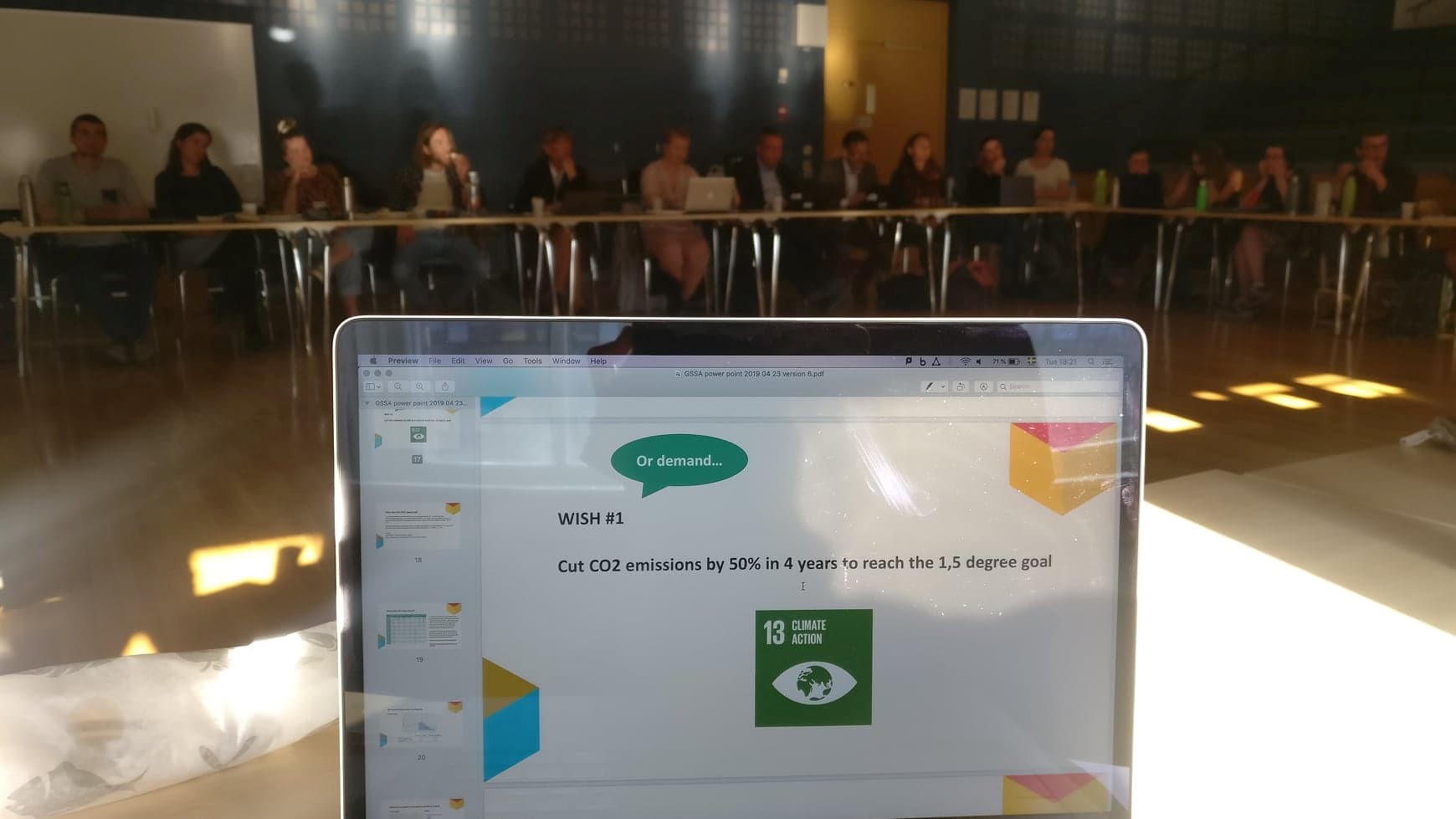- Home
- News and events
- Find news
- Students demand more sustainable development in education and reduced climate impact
Students demand more sustainable development in education and reduced climate impact
 Student associations in the field of sustainability from Chalmers and the University of Gothenburg want to see more sustainable development in education and reduced climate impact. They recently held a meeting with the President and CEO of Chalmers and Vice-chancellor of the University of Gothenburg, and a few others from the management teams at both institutions. A list of five demands was presented.
Student associations in the field of sustainability from Chalmers and the University of Gothenburg want to see more sustainable development in education and reduced climate impact. They recently held a meeting with the President and CEO of Chalmers and Vice-chancellor of the University of Gothenburg, and a few others from the management teams at both institutions. A list of five demands was presented.
Student groups in the field of sustainability in Gothenburg have been meeting the President and CEO of Chalmers and Vice-Chancellor of the University of Gothenburg regularly since 2014. The meetings were initiated by Moa Persson, coordinator for student collaboration at the Gothenburg Centre for Sustainable Development (GMV). The aim is to enhance collaboration on sustainable development between students at both universities and with society at large. The most recent meeting was held on 23 April this year. In addition to Stefan Bengtsson, President and CEO of Chalmers University of Technology, and Eva Wiberg, Vice-chancellor of the University of Gothenburg, the meeting was attended by more people than usual.
“We previously held meetings between the student groups and Stefan Bengtsson and Eva Wiberg, but at the initiative of Stefan Bengtsson, more members of the management teams were invited this time. This makes it clear that they see value in meeting the students and listening to their views,” says Moa Persson.
Stefan Bengtsson and Eva Wiberg emphasised the importance of students working via their students’ unions so that climate change work can be managed via the normal channels for collaboration between the institutions and the students’ unions. At the autumn meeting with the President and Vice-chancellor, the students presented a long wishlist of environmental improvements they want to see at the universities. For this recent meeting, the students highlighted five priority areas from the wishlist or list of demands:
- The universities must reduce their CO2 emissions by 50% within 4 years to achieve the 1.5 degree target
- Ensure that all education includes sustainability by 2020
- Set aside funds to support student-led sustainability projects
- Appoint two Student Sustainability Coordinators in each faculty to enhance student participation in university sustainability work
- Regularly send out newsletters to all employees and students in which sustainability is a standing item
To reduce climate impact and increase the integration of sustainable development in education, the students presented specific proposals for action. One proposal was to scrap the admission criteria that prevent students from taking courses in areas other than their basic area. This would make it possible to take an additional course in sustainable development, for example. The students also expressed concern about climate change. Based on the IPCC report and taking inspiration from many cities and universities worldwide, the students had prepared a draft decision to announce a climate emergency before the end of the spring term.
“Both I and Stefan Bengtsson take the issue of climate change extremely seriously. We are already doing very well, but we also need to do better. We need to work together, tackle the less complicated measures and find solutions to the more difficult problems,” says Eva Wiberg, Vice-chancellor of the University of Gothenburg.
When the demands and the measures were discussed, the tone was hard at times, reflecting the students’ fear about the future.
“We students can raise our voices, but the decisions must be made by those in managerial positions,” said one of the students.
Fredrik Hörstedt, Vice President of Utilisation at Chalmers agreed, saying that:
“Chalmers’ aim is for its operations to meet the IPCC report target of maximum 1.5 degrees of warming. These challenges are so complex that we need to work together across generations. Teamwork is required, and we need to involve the students in this work.”
The students were pleased to have presented their demands to the President, Vice-chancellor and the management teams. One of the students wrote after the meeting:
“I hope and believe that management listened to our proposals. As passionate supporters of these issues, it gives us hope to be able to exert influence over decision-makers and make a difference.
Facts
Student associations in the field of sustainability in Gothenburg work together via the Gothenburg Students for Sustainability Alliance (GSSA), which is coordinated by GMV. Read more about GSSA here.
The meeting was attended by:
Representatives of these student associations:
Social Science Environment Student Association, Pedagogen Students for Sustainability, Chalmers Students for Sustainability, Lindholmen Students for Sustainability, Science Students for Sustainability, Ingenjörer utan gränser Chalmers (Engineers without Borders at Chalmers), Veggie at My Place, Global Students for Sustainability, Chalmers PhD students for Sustainability, Klimatstudenterna (Climate Students), Stay Grounded Project, Black Dot, the University of Gothenburg students’ unions and EuroEnviro2019.
From Chalmers:
Stefan Bengtsson, President and CEO
Anna Dubois, First Vice President and Deputy CEO
Fredrik Hörstedt, Vice President of Utilisation
From the University of Gothenburg:
Eva Wiberg, Vice-Chancellor
Mattias Goksör, Pro-Vice-Chancellor
Fredrika Lagergren Wahlin, Deputy Vice-Chancellor, responsible for issues regarding outreach and cooperation
Photo: Elissa Shaw